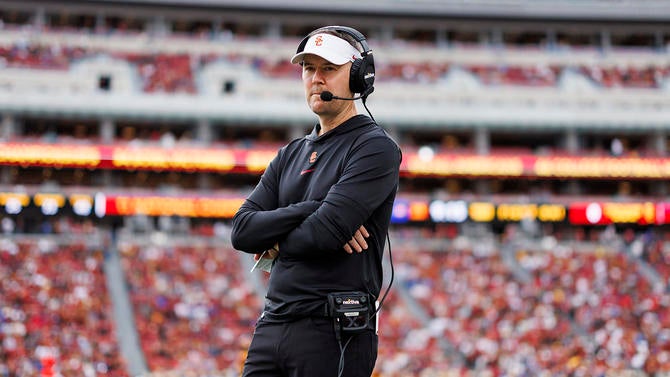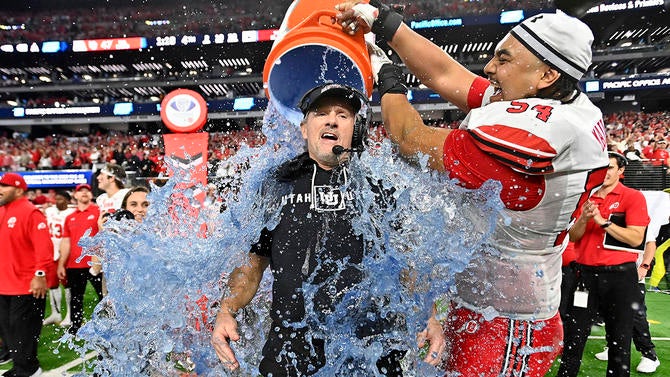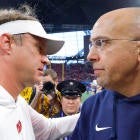
The new 12-team College Football Playoff format will make its debut this season, bring wide-ranging changes to how we talk about, analyze and ultimately decide the champion in the sport.
Proponents of the format routinely point to the benefit that increased access will have for all of college football: more teams being in the mix to make the playoff later in the season will drive increased interest deep into November; the presence of seven at-large bids allows for teams to remain in the hunt even if they are out of their respective conference title races.
The logic makes sense, but increased opportunity to remain in the playoff race will also be paired with increased expectations to make the playoff. Any reasonable fan could look at the playoff monopoly held down by just a half-dozen power programs — Alabama, Georgia, Clemson, Ohio State, Michigan and Oklahoma have combined to account for 72.5% of the CFP bids — and adjust their expectations for their favorite team's chances of making the playoff.
Throughout the 10 years of the four-team format, we saw teams (and coaches) put together strong campaigns that fell short of the playoff but ended in a New Year's Six bowl. Such a season may have had some disappointing moments along the way, but at the end of the day, they were viewed as a success. With expansion, those at-large spots for the New Year's Six are now at-large spots for the CFP, so programs that have been falling just short in years past are now going to be expected to make the field moving forward.
And it's with that premise that we take a look at seven coaches who are leading programs that have come close but failed to make the the CFP in the first 10 years of its existence. These are coaches leading programs who may have considered the New Year's Six a success in he past but now look to get a crack at winning it all in the 12-team bracket.
James Franklin, Penn State
No program has more New Year's Six bowl appearances without a CFP bid than Penn State. The Nittany Lions have played in a New Year's Six bowl game five times in the last eight years (with a 3-2 record in those games) and even won the Big Ten championship in 2016 but did not get selected for the playoff. The hiccup for Franklin has frequently come at the hands of Ohio State, Michigan or both. In fact, the Buckeyes and Wolverines represent the only regular-season losses for Penn State over the past two seasons.
But now two things have happened that benefit Penn State's postseason outlook in a major way. Not only is the Big Ten getting rid of divisions, which increases the Nittany Lions' chances to compete for a conference title, but the playoff is expanding in a way that would have made many of those New Year's Six seasons a potential playoff year. Franklin has done a tremendous job of establishing a standard at Penn State, and routinely turning in 10-win seasons has kept real job pressure (externally, at least) somewhat low. But now that there is an achievable goal to lead Penn State where it has not yet been, the pressure is going up. The Nittany Lions have a team, and a schedule, to be in the thick of the Big Ten title and CFP races. So unlike previous years when Penn State might've played out the string after falling to Ohio State and/or Michigan, the late-season games for the Nittany Lions are going to packed with playoff pressure for the team and its coach.
Lane Kiffin, Ole Miss
There is one read of Kiffin's tenure at Ole Miss that identifies this current run as one of the most successful in modern program history. The Rebels were among the top teams in the country in the late 1950s and early 1960s under Johnny Vaught, but from 1971-2011 Ole Miss won 10 or more games just twice (1971, 2003) and never finished higher than No. 13 in the final AP Top 25. The program peaked again under Hugh Freeze before stumbling in the wake of scandal, but Kiffin has brought Ole Miss back to the forefront of the sport by rolling off 29 wins with a pair of top-11 finishes across the last three years. With four appearances split evenly between Kiffin and Freeze over the last 10 seasons, Ole Miss is second only to Penn State in New Year's Six bids.
If you have been paying attention to the Rebels' offseason, then you are well aware that they have built a roster to make a CFP run, relying on big-time transfer portal additions to load up for a season that has the schedule to win 10 games yet again. So while Kiffin has exceeded the historic program standard, the expanded playoff has changed the expectations for Ole Miss at the end of the year. The Rebels have invested like a playoff team because increased access has opened a door to make the playoff. If Ole Miss can't take the next step, then those New Year's Six bowl appearances and high poll rankings aren't going to be enough to keep the pressure from rising in Oxford.
Lincoln Riley, USC
This is an interesting one because Riley, unlike many other coaches on this list, has been to the CFP, even though the program he is currently leading has not. The combination of USC's playoff shortcomings, including Riley's 11-3 debut in 2022, coupled with Riley's own inability to advance out of the semifinals at Oklahoma (he was 0-4 in CFP appearances), will bring heightened scrutiny when it comes to how USC fits in the playoff picture.
Though coaching instability has been the theme of USC football since 2010, the Trojans' program power has helped produce two different peaks in the playoff era resulting in three New Year's Six bowl appearances. A Rose Bowl win in 2016 and Pac-12 title in 2017 under former coach Clay Helton seemed to show promise for a return to glory, but the slide that followed kept USC out of the national picture and really damaged expectations for a proud program with multiple national titles in the trophy case.

Then, Riley had the Trojans playing for the Pac-12 title on the first Friday night in December 2022, positioned in the top four of the CFP Rankings and just needing a win to make program history. If not for a Caleb Williams' hamstring injury and a late Utah offensive explosion, we might not be here discussing playoff pressure. As it is, the Trojans are entering the Big Ten hungry to hit the ground running when it comes to conference title and playoff contention.
The issue for 2024 is that USC is not projected to be in the playoff mix at all. The Trojans have odds that align with an 8-4 of 7-5 season and are favored to not make the playoff (-590). So while the big-picture expectations are for Riley to get USC into the playoff now that the field has expanded, the immediate outlook suggests it might not happen in 2024, and that's only going to increase the pressure going into 2025.
Hugh Freeze, Auburn
We're looking at big-picture pressure here because I don't think anyone is expecting Auburn to make the College Football Playoff in 2024, but if things aren't moving in that direction for the 2025 season, we will see the tone change around Freeze's program. Freeze himself has reached the New Year's Six twice as a coach; Auburn has two appearances as well, getting there under Gus Malzahn in 2016 and 2017. The Tigers are always going to be motivated by the success of their two biggest rivals, Alabama and Georgia, and while in the past those programs may have been a roadblock to success within the SEC, and thus in the playoff race, there is now an open door for Auburn to even take a couple of losses and remain in the mix to make a 12-team field.
The key in 2024 will be for Freeze to show that big wins on the recruiting trail are paying off on the field, with young stars from his first classes evolving into high-level impact players over the next 12 months. Combine that player development with some transfer portal work next offseason — where I expect Auburn is loading up to be one of the big players in the market — and there are going to real expectations to contend for the 12-team playoff in 2025.
Luke Fickell, Wisconsin
While Fickell made the playoff in historic fashion, guiding Cincinnati to an undefeated regular season and the first CFP appearance for a Group of Five program, Wisconsin has yet to make the playoff despite several successful seasons across the last decade. The Badgers rode a streak of strong division play to multiple Big Ten title games and three New Year's Six appearances (2016, 2017, 2019). The decision to move on from Paul Chryst, who was responsible for those three NY6 runs, and hire Fickell indicated a desire for the Badgers to take that next step.
The fact that Fickell's debut season ended with a 7-6 record, including losses to Indiana and Northwestern, is only going to increase pressure for a bounce back in 2024. Wisconsin historically is not going to be in the same conversation as Ohio State, Michigan and Penn State, but the coaching prowess and pedigree of Fickell, combined with the program's success from 2010-2019 (three Big Ten titles, six top-13 AP Top 25 finishes), have established expectations that the Badgers can be a top-15 program. Being a top-15 program in the 12-team era means you are in the hunt for a playoff spot and thus carry playoff expectations, so while 2024 might not be the year, it won't take long for Fickell to feel that playoff pressure.
Kyle Whittingham, Utah
Franklin and Kiffin have teams that are actually favored to make the CFP in 2024, so you could argue there is more pressure there, but Whittingham arguably has a clearer path to the playoff now that Utah is in the Big 12. The Utes are the co-favorites to win the Big 12 (+350, along with Kansas State), and doing so would likely secure one of the four automatic bids that produce a first-round bye.
Whittingham has led Utah to the New Year's Six twice, reaching the Rose Bowl in both years after back-to-back Pac-12 titles in 2021 and 2022. Injuries ravaged the 2023 squad, but with QB Cam Rising back for another year and a good amount of production returning on defense, it's a group that can absolutely win the Big 12 in its first season for the program's first CFP appearance. Now, if things break bad and the first year of Big 12 play does not produce a season in line with expectations, that's when we'll see pressure start to mount for Utah to take the next step.

Josh Heupel, Tennessee
Tennessee is the only program on this list without multiple New Year's Six appearances, but the 2022 Orange Bowl win against Clemson did come under Heupel's guidance. That season represented a true breakthrough moment that changed expectations for the Volunteers. Heupel faces the same challenges as the rest of his SEC colleagues in navigating a schedule that includes multiple national title contenders, but Tennessee is also recruiting and developing in a way that suggests the standard is to keep pace.
If we were entering eight more years of the four-team playoff era, Heupel could potentially run off 10-win seasons every other year, making numerous New Year's Six bowl appearances and staving off any real pressure given the outlook and probabilities involved with a four-team bracket. In a 12-team format that will potentially have three or four bids available to SEC teams, however, Tennessee will be expected to compete for an at-large spot if it's not playing the SEC championship.
















